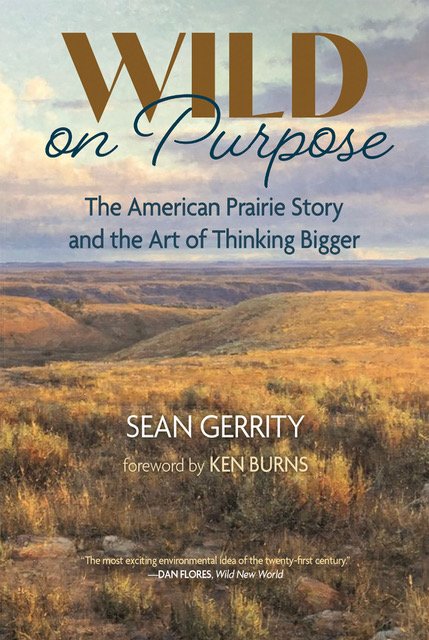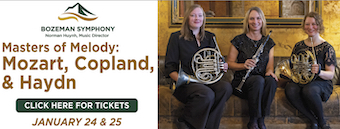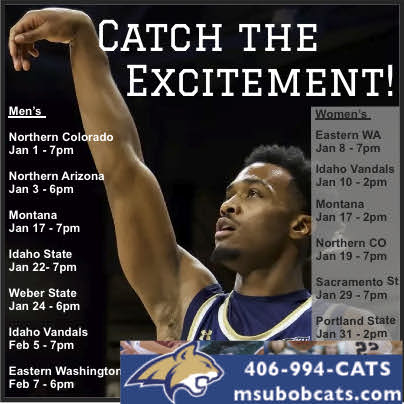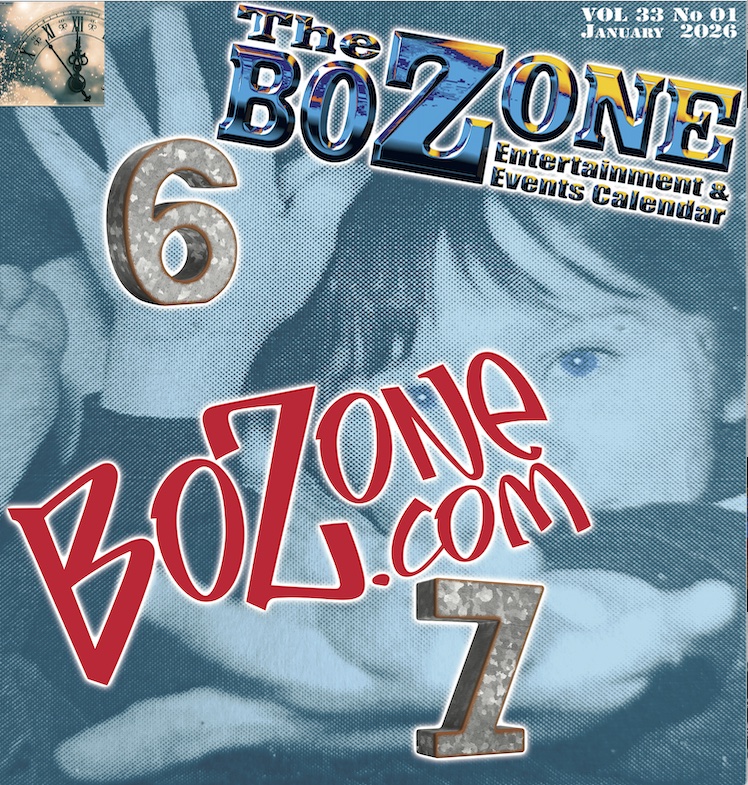Story Mansion plays host to special program, ‘The Life & Music of Django Reinhardt’
A musical birthday celebration of renowned guitarist and composer Django Reinhardt and the gypsy jazz music he created will be held at the historic Story Mansion later this month.
The Coyote Gypsies will open the evening with an instrumental journey through some of the gypsy and European folk music traditions that influenced a young Django.
Montana Manouche will then perform the Parisian WWII-era swing music of Django Reinhardt, Stéphane Grappelli, and the Hot Club of France.
In anticipation of the upcoming Story Mansion performance, The Rolling Zone sat down with Montana Manouche violinist Nancy Padilla to talk all things Django and breathing new life into the gypsy jazz tradition in Southwest Montana.
RZ: Montana Manouche is gearing up for a birthday celebration of Django Reinhardt and his Gypsy jazz music later this month. What can attendees expect from this evening of music and festivities?
NP: This is the third time we’ve done this, and each one has been a little bit different. This year, we have another band. The Coyote Gypsies are going to open the show with some gypsy folk music, the music that would have inspired the young Django Reinhardt. They’re really passionate about what they do. Then there will be an intermission with birthday cake. Montana Manouche will perform the second set with a program of Django Reinhardt compositions, mostly, with a few other ones he recorded thrown in. It’ll be in chronological order with some information on the history of the tune and what was going on in the world at the time.
RZ: It should be entertaining and educational.
NP: We got going on this when we were playing on the lawn of the Library a few years back. The audience was listening to us and was really interested in the history. I thought it would be really neat to do a concert where we let people know about the history of the tunes. It’s totally fascinating [and] all tied in with WWII and the gypsy culture.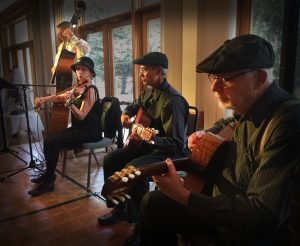
RZ: For those perhaps unfamiliar, can you give us a little background on gypsy jazz and Reinhardt’s contributions to its popularity.
NP: Django was born in Belgium in 1910. His family lived in a caravan, as gypsies did back then. [He] and his brother began busking on the streets of Paris when Django was age 12. He joined a dance band led by his father and uncle, [ending up] in high demand playing the dance halls of Paris. During the 1920s, Paris was booming with nightclubs featuring American jazz bands. In 1926, Django went to the club where Billy Arnold’s Novelty Jazz Band was playing night after night and just started learning the music. He’d gradually build up a repertoire of American jazz tunes, [and because] he didn’t read music, he learned the melodies by ear. Since he was already an accomplished gypsy musician, [the genres] just sort of merged together in a really great way. The actual style of gypsy jazz music started in about 1930 when Django teamed up with French jazz violinist Stéphane Grappelli. They started playing American jazz tunes in this special way and become very popular.
RZ: That’s so interesting.
NP: In the midst of all that, Django was in a horrific fire [in] the caravan where was staying. He was burned really badly, losing the use of two fingers. He had to learn how to play with just his thumb and two fingers, hardly using his ring finger or pinky at all. It’s really compelling and inspiring someone could have that much of a passion for being a musician that they’d overcome this huge obstacle of losing use of two fingers. His limitations actually inspired his style of playing.
RZ: How did Montana Manouche become the group of performers it is now?
NP: About eleven years ago, my husband and I attended a gypsy jazz festival in San Francisco. We had been playing mostly bluegrass [up to that point], but I’d always loved the style. There were some workshops at the festival and we got really excited about playing. So, we started playing around the house, learning the music. Then we happened to start jamming with Dave Sullivan, who’s our lead guitar player. Dave has a reputation as a really fine, straight-ahead jazz guitarist and we really didn’t know he was into that kind of music. We all just started jamming on the songs and thought maybe we should try doing some gigs.
RZ: You mentioned The Coyote Gypsies opening the show. Who is this group and how did they become involved with this celebration?
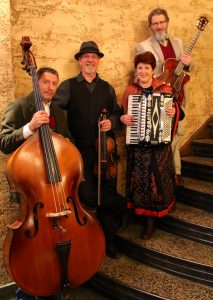 NP: We met at the Wednesday night string jam at the Story Mansion. Then I saw them around town and really liked what they were playing. It’s really special to be able to hear what they do. I’m not exactly sure what they’re going to do, but for this program they’re going to play some gypsy folk tunes that predate 1930. We’ll take over from there, bringing it into mostly Django’s life and a little into the modern day with what people are doing nowadays. The music is still evolving, and people are still writing tunes. There are some special things happening with the evolution of gypsy jazz music.
NP: We met at the Wednesday night string jam at the Story Mansion. Then I saw them around town and really liked what they were playing. It’s really special to be able to hear what they do. I’m not exactly sure what they’re going to do, but for this program they’re going to play some gypsy folk tunes that predate 1930. We’ll take over from there, bringing it into mostly Django’s life and a little into the modern day with what people are doing nowadays. The music is still evolving, and people are still writing tunes. There are some special things happening with the evolution of gypsy jazz music.
RZ: Does gypsy jazz require any particular style of instrument?
NP: Our guitarists play very special, Maccaferri-style guitars. They’re both really, really nice instruments. It’s kind of worth coming to the show just to see them. David and Ray are both really proud and honored to own them. They’re built by a really amazing luthier in the Pacific Northwest named Bob Holo. A lot of the big names in gypsy jazz, who are largely European, are playing Holo guitars. And that’s really important. You don’t need a special violin, you don’t need a special bass, but you do need a special guitar to get that Django sound.
RZ: Isn’t the Story Mansion a perfect setting to enjoy these instrumentals?
NP: The Story Mansion was built in 1910, which is the year of Django’s birth. I can’t think of a better ambiance than that. And the City of Bozeman has been very wonderful to work with. I’m so grateful Bozeman has that venue. It holds about ninety people, and I think a listening venue of that size is needed in the community. We love all our gigs, we really do, but we don’t have the opportunity to talk at most. This show gives us the opportunity, once a year, to really shine a spotlight on this amazing style of music and how it began.
RZ: You’ve been performing with this group around the greater Bozeman area for some time now. Are you ever surprised with audiences’ reception of this music?
NP: Our first show was in 2012 and we have been surprised. We’re quite traditional and very much in keeping with what Django was doing in the 1930s. We weren’t sure what people would think. There’s a pretty big swing dance club in Bozeman, the SwingCats, and it’s especially been fun to see that they enjoy dancing to our music. People that come to see us always really enjoy the dancers. There’s a lot of interesting gypsy jazz all over the country. In November, we played at the gypsy jazz festival in Billings [with] six bands there from our area, five from Montana and one from Wyoming. The festival was sold out and it was really fun to meet the other bands. There were some great after hours jam sessions, too. We all played music together and got some wonderful friendships out of the deal. We’re really having fun.
RZ: On top of your many area performances, Montana Manouche also plays a number of private events. At what sort of gatherings do you perform?
NP: We’ve done anniversaries, outdoor gatherings, and quite a few weddings. We’ve also really enjoyed playing during the Art Walks. We played for a lovely benefit in October, a “Bootlegger’s Ball” in Red Lodge. The theme was a 1920s speakeasy. Everyone was dressed up, including us, in ‘20s garb. It was a lot of fun with a lot of great dancers.
RZ: What does this group hope to achieve through its performances?
NP: Our hope is that we can play music that’s joyful and lifts people’s spirits.
RZ: Lifting spirits thanks to the grandfather of gypsy jazz.
NP: He’s the king of gypsy jazz. Grappelli was a huge part of the sound, too, but Django deservedly gets the bulk of the credit.
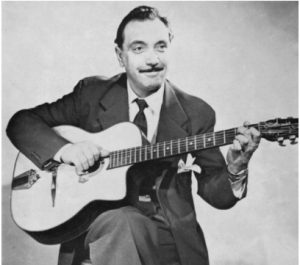
Montana Manouche presents “The Life and Music of Django Reinhardt” alongside The Coyote Gypsies on Saturday, January 20th at the Story Mansion beginning at 7pm. Advance tickets are $13 and available in-store at Cactus Records or www.cactusrecords.net. Remaining tickets will be $16 at the door. Seating is limited. For further information about the event, please visit www.montanamanouche.com or www.coyotegypsies.com.
Montana Manouche is Nancy Padilla (violin), Ray Padilla (rhythm guitar), Mike Carey (upright bass), and Dave Sullivan (lead guitar).
The Coyote Gypsies are Mark Schlenz (violin, banjo, mandolin, harmonica) and Jane Freeburg (accordion) with Jim Dungan (guitar) and Mike Carey (bass).
This evening performance is sponsored by the City of Bozeman’s Parks & Recreation department and Bozeman Folklore Society. •

